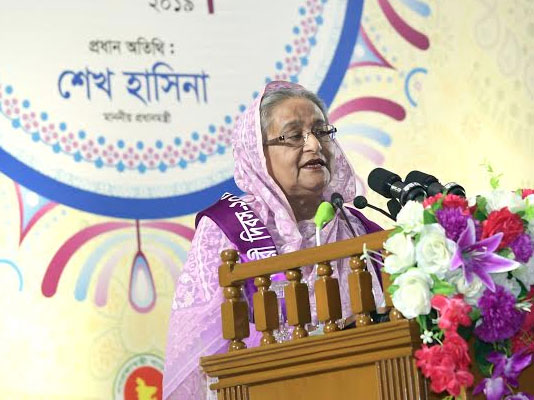DHAKA, March 9, 2019 (BSS) – Prime Minister Sheikh Hasina today called upon
the country’s womenfolk to achieve power with their own ability as the
government has ensured their equal opportunities in various sectors to
empower them.
“Though, we have given them (women local representatives) power, but they
cannot apply it. I would like to tell them, who are now in charges (of local
government bodies), they need to achieve the power with their own
capabilities as none will hand over it to them,” she said.
Referring to the government initiatives to empower women in politics, she
said her government has made reserved one-third seats for women in the local
body elections such as unions, upazilas and municipalities alongside a seat
for woman vice-chairman in upazilas as they can perform specific
responsibility.
The premier was speaking at a function as the chief guest arranged by
Ministry of Women and Children Affairs on the occasion of International
Women’s Day, 2019 at Bangabandhu International Conference centre here.
“Women have been playing significant role in politics, judiciary, armed
forces, police, administration, education, trade and commerce, sports and
games, and adventures,” Sheikh Hasina said, adding that women in many cases
outnumbered men particularly in education and sports.
In this context, the premier recalled the contribution of Father of the
Nation Bangabandhu Sheikh Mujibur Rahman, saying that Bangabandhu started
the process of uplifting women by establishing their equal rights with men in
all spheres of the state and public life as constitutional obligation.
The women had no scope to enter judiciary in line with the Pakistani laws
but Bangabandhu paved the way for them in joining judiciary after annulling
the Pakistani laws, she mentioned.
Sheikh Hasina also remembered Bangamata Begum Sheikh Fazilatun Nesa Mujib’s
contribution to this end, saying “She (Bangamata) worked for the country
along with Bangabandhu all the time by giving him inspiration, courage and
suggestions.”
Chairman of the Parliamentary Standing Committee on the Ministry of Women
and Children Affairs Meher Afroz Chumki chaired the meeting, while UN
Resident Coordinator and UNDP Representative in Bangladesh Mia Seppo was
present at the function as the special guest.
Women and Children Affairs Secretary Kamrun Nahar delivered the welcome
address.
This year’s theme of the day is – ‘Think Equal, Build Smart, Innovate for
Change’.
At the function, a documentary on the government’s development activities for
the women was screened.

The premier also stressed the need for working together of men and women
saying, “Half of the population of our country is women. So we cannot prosper
keeping this population behind.”
Nowadays, women become successful everywhere including state management,
administrating parliament, top positions in police, judiciary, military
force, health, engineering, business even flying planes due to government’s
pragmatic and timely measures, she rejoiced.
Highlighting her government’s initiatives to include womenfolk in the
mainstream of the country’s development, the premier said, “The government
framed the ‘National Women Development Policy-2011’ and adopted the ‘National
Action Plan-2013’ for implementation of the policy.”
“We’ve increased maternity leave from 3 months to 6 months with salary and
introduced the provision to keep mother’s name along with father’s name in
every aspect,” she said, adding that gender budget of Taka 1,37,742 crore has
been allocated in 2018-2019 fiscal.
Describing financial solvency as a key for women empowerment, she said, the
Awami League government made sixty percent posts of primary school teachers
mandatory reserved for women aimed at making them economically solvent.
As the women can do their jobs without any hindrance, the premier said “We
are mulling of setting up hostels for working women at district and upazila
levels alongside building daycare centre for taking care of their babies”.
“We have already set up eight women hostels having capacity of
accommodating 19,929 working women and 94 daycare centres with facilities of
giving necessary services to 36,183 children of working mothers,” she
continued.
The government has established a foundation namely ‘Joyeeta’ to promote
women in businesses and entrepreneurship, she said.
Sheikh Hasina mentioned social awareness is necessary to stop disparity and
violence against women with enacting laws.
She said, “The government has enacted necessary laws with a view to
protecting the women and children from all types of violence. But, the laws
only cannot stop the menace. Social awareness is needed in this regard.”
She, however, referred to the laws including ‘Women and Children
Repression Prevention Act- 2000’, ‘Women & Children Repression Prevention
Act-2003(Amended)’, the ‘Mobile Court Act-2009’ ‘Child Marriage Restraint
Act-2017’, Domestic Violence (Prevention and Protection) Act 2010, ‘DNA Act-
2014’ and ‘Dowry Restraint Act-2018’in this perspective.
A toll free national helpline 109 has also been introduced to prevent
women and children abuse, she informed.
“In order to prevent domestic violence against women, 67 one-stop-crisis
centers alongside establishment of women abuse resistance cells and women
assistance programs in 6 divisions have been introduced to ensure quick
justice to victim women,” she also said.
About 4,883 adolescent clubs has been formed across the country for
positive changes in the lifestyle of teenage girls and boys, she noted.
Regarding women success in sports, the premier said, “Our girls didn’t lag
behind in sports either. Our girls became undefeated champions in Jockey-club
girls’ international tournament, Hong Kong’s in 2018”.
She also said the national women team qualified for the ICC World T20
cricket in 2020 while Bangladesh women football team also qualified for the
‘FIFA under-17’ which will be held in Thailand in September 2019.
Earlier, the prime minister handed over “Joyeeta Sammanana” to five women
for their outstanding contributions to their respective fields.
The recipients are Parul Akhter, Anamika Thakur Shilpi, Begum Razia
Mahmud, Hasna Begum, and Shakera Begum Banu.



